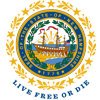Wildlife Habitat Fee
Wild Places for Wildlife: An Investment in New Hampshire's Habitats
New Hampshire's wildlife habitats face some huge challenges in the years ahead. Each year, thousands of acres of habitats are lost to new housing or commerce. Meanwhile, New Hampshire's forests are maturing, edging out our limited supply of early successional forests and open grasslands -- habitats for woodcock, grouse, rabbits, songbirds, deer and many other species.
Starting in 1999, many exciting opportunities became available to improve and protect New Hampshire's wildlife habitat. This is due to the new wildlife habitat checkoff, which the NH Legislature approved in 1998.
Here's a look at how the new program works and how it will help this state's habitats.
What does the habitat check-off accomplish?
The check-off's proceeds are dedicated solely to funding wildlife habitat management and protection.
How much does it cost?
$2.50 per year.
How often will I have to pay?
Once a year, when you purchase your first hunting license. If you buy a bowhunting license first, you'd pay the $2.50 then; if you buy a general hunting license later that year, you won't pay it again.
I have a lifetime hunting and fishing license. Do I have to buy the habitat check-off every year?
No. Among those exempt from paying the habitat fee every year are those with lifetime licenses or those with special licenses, such as paraplegics and disabled veterans. However, future lifetime license buyers will have to pay the $2.50 fee when the license is purchased.
Is this a habitat stamp or license?
For the first year (1999), it was a stamp, a bull moose in his North Country terrain painted by Department artist Victor E. Young. Since 2000, the habitat fee has been a check-off on the license.
Aren't there already programs to help New Hampshire's habitat?
Yes, the Department has several good technical assistance programs that provide habitat management recommendations on both public and private lands. But funding for actual on- the-ground work has been very limited. The dedicated habitat account will allow us to fund recommended projects, in partnership with landowners.
Why is this needed?
For two reasons: first, because the natural and human challenges facing New Hampshire's wildlife habitats are serious and require reasonable, effective and responsible action. It is part of the mission of the New Hampshire Fish and Game Department to manage, protect and restore this state's habitats.
Second, because the public -- hunters and nonhunters alike -- understands these complex issues and demands sound action to protect New Hampshire's wildlife habitats. In 1996, this Department heard from hundreds of people on all aspects of its operations as part of a strategic planning process. One message heard loud and clear consistently around the state was: "Pay more attention to habitat."
Why does New Hampshire's habitat need so much attention?
The continued health of our wildlife populations depends on the availability of high-quality habitats. All across the state, wild lands that provide habitat are being lost to residential and commercial development. Large forested blocks are being fragmented by subdivisions and converted to other use.
Natural changes are also affecting habitat. Our forests continue to mature, and in some parts of the state, young forests and early successional habitats have declined significantly. Open grassland habitats have also declined dramatically, along with populations of wildlife that depend on them -- both game and nongame. Among the species that need these habitats are ruffed grouse, woodcock, wild turkey, deer, rabbits and a variety of songbirds.
How will hunters benefit?
In addition to helping sustain good game covers, such as early succession upland habitats, hunters will benefit from maintaining, and in some cases improving, hunter access to lands upon which these funds are spent.
What is the Fish and Game Department doing with the money?
The work will take two tracks: first, managing habitats on private and public lands; and second, protecting significant habitats via the purchase of land or conservation easements (development rights). One possible scenario of management projects funded from the dedicated account would be to:
- mow 400 acres of grassland habitat;
- restore 100 acres of early successional habitat;
- release 400 wild apple trees and plant another 400 fruiting trees to establish "wild orchards" for wildlife.
Habitat protection through the purchase of land or easements quickly gets very expensive. Income to the dedicated habitat account will only allow for a modest level of land acquisition, which will be employed only when significant benefits to wildlife and the hunting public will be realized. To maximize the account's effectiveness in habitat protection, funds may be allowed to accumulate for several years.
To enhance the volume for land protection efforts, the Department will draw on the benefits of partnering with other organizations, such as local land trusts, the Society for the Protection of New Hampshire Forests, Audubon Society of New Hampshire, The Nature Conservancy and others.
This sounds pretty ambitious. How can I help?
Whether you hunt or not, you can help, particularly by helping us make connections. Department staff will be identifying areas around the state that need attention, either by management strategies or protection. If you know of some important areas, contact our regional biologists, conservation officers or the Wildlife Division in Concord.



